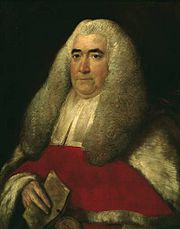
A Discourse on the Study of the Law
Encyclopedia

William Blackstone
Sir William Blackstone KC SL was an English jurist, judge and Tory politician of the eighteenth century. He is most noted for writing the Commentaries on the Laws of England. Born into a middle class family in London, Blackstone was educated at Charterhouse School before matriculating at Pembroke...
first published in 1758. On 20 October 1758 Blackstone had been confirmed as the first Vinerian Professor of English Law
Vinerian Professor of English Law
The Vinerian Professorship of English Law, formerly Vinerian Professorship of Common Law, was established by Charles Viner who by his will, dated 29 December 1755, left about £12,000 to the Chancellor, Masters and Scholars of the University of Oxford, to establish a Professorship of the Common Law...
, and immediately gave a lecture on 24 October, which was reprinted as the Discourse. The Discourse was designed to be a work on how to study English law
English law
English law is the legal system of England and Wales, and is the basis of common law legal systems used in most Commonwealth countries and the United States except Louisiana...
, and the importance of doing so. Blackstone emphasised the advantages of a civilian legal education over the training for a call to the Bar
Call to the bar
The Call to the Bar is a legal term of art in most common law jurisdictions where persons must be qualified to be allowed to argue in court on behalf of another party, and are then said to have been "called to the bar" or to have received a "call to the bar"...
, arguing for the inherent dignity of study at a University. He was particularly alarmed by the growing practice of sending a potential lawyer to work in an attorney's office, saying that: In Continental Europe and Scotland, the academic study of the law was regarded as a required part of a gentleman's training, but it was not in England; the aristocracy "have been more remarkably deficient than those of all Europe". This was because the "stylistic barbarisms and crafty practitioners" were seen as below the aristocracy, and not conforming to gentleman-like sensibilities.
Blackstone also emphasised the need for gentlemen to study not only the law, but English law, to secure the continuation of the British tradition of civil liberties, arguing that "[W]e must not carry our veneration [of the civil law] so far as to sacrifice our Alfred and Edward to the manes of Theodosius and Justinian, we must not prefer the edict of the praetor, or the rescript of the roman emperor, to our own immemorial customs, or the sanctions of an english parliament; unless we can also prefer the despotic monarchy of Rome and Byzantium, for whose meridians the former were calculated, to the free constitution of Britain, which the latter are adapted to perpetuate". Described as a "sensible, spirited and manly exhortation to the study of the law", the initial print run of the Discourse sold out, necessitating the publication of another 1,000 copies. Later versions of his An Analysis of the Laws of England
An Analysis of the Laws of England
An Analysis of the Laws of England is a legal treatise by British legal professor William Blackstone. It was first published by the Clarendon Press in 1756. A Fellow of All Souls, Oxford, and a lecturer there, on 3 July 1753 Blackstone announced his intentions to give a set of lectures on the...
and the first volume of his Commentaries on the Laws of England
Commentaries on the Laws of England
The Commentaries on the Laws of England are an influential 18th-century treatise on the common law of England by Sir William Blackstone, originally published by the Clarendon Press at Oxford, 1765–1769...
were prefaced with copies. Paul Lucas, writing in the English Historical Review, notes that unlike his other works, Blackstone's Discourse survived its various editions with no modifications whatsoever, showing that he considered it "a key statement of his opinions".

